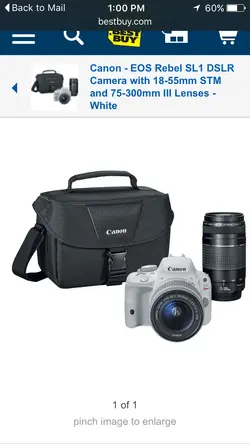Don't spend your entire budget on a camera and lens(es).
You'll need good software to process your photos, spend your money there too. Maybe your computer and monitor need an upgrade also.
Determine how you will display your photos. If you are going to print your own work, maybe you should invest in a better printer.
Most of today's entry level cameras will take exactly the same image quality as a camera further up the line for higher cost. What you'll get with the more expensive camera is more buttons and switches to learn. The base line camera will have everything the up-line camera has, you'll just have to learn to find it in a menu. Too many controls will often become more of a hindrance than a help to the student photographer.
Recommended Cameras
Paying more often isn't going to get you any bit better image quality if you know how a camera operates.
DPReview Gear of the Year: Canon Rebel SL1 / EOS 100D
A $500 camera and a $1k camera with the same sensor and processor will take essentially the same image quality. Lenses will make a difference but learn when you need a better lens before you invest in a better lens. Most of the kit lenses available today will take exceptionally good quality photos and packaging them with your initial purchase makes them a bargain.
Buy one good prime lens to start with in addition to your kit lens. A 50mm prime is typically the best place to start. You can buy a 50mm, f1.8 Canon prime for under $150. You can't go wrong at that price.
You'll want a nice tripod to hold the camera if you are doing landscape work. Maybe a monopod also if you want to take your camera out on a trail.
Very few filters are necessary with a DSLR. In general, avoid any prepackaged kits that include a lot of totally useless crap thrown in to make the deal look better to a newbie. You won't use and won't want most of the add ons they stick in there.
Head to a local shop and ask a lot of questions. Put your money into those things that will assist your photography in the real world. A good working relationship with a local camera shop is worth more than any real amount of money you could pay on line. After the sale advice and service from a trusted source is priceless.
No need to get caught up in the never ending cycle of new gear acquisition. Learn your camera and your software and you will eventually know when you need more.
Photography is about thinking, not just buying.








![[No title]](/data/xfmg/thumbnail/34/34083-76406a409bc520ead3cc11af09ebd257.jpg?1734164516)




![[No title]](/data/xfmg/thumbnail/32/32153-05f63098d8752b05df53dfa6ae8d6e7d.jpg?1734161045)